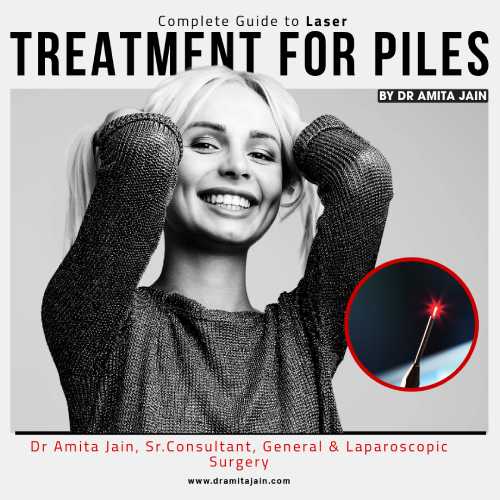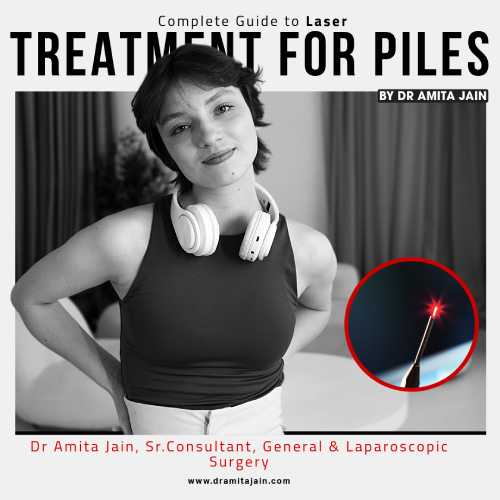Hemorrhoids, commonly known as piles, are swollen blood vessels located inside or around the rectum. It causes discomfort, itching, and sometimes even bleeding. It is advisable to seek medical assistance if these symptoms persist for more than a week despite home treatment, or if there is consistent rectal bleeding.
Though piles often resolve on their own, various treatments are available to alleviate symptoms. In severe cases, surgery might be the best option. Dr Amita Jain, one of the top laparoscopic surgeons and piles consultant doctors in India explains the laser treatment of piles in detail in this article.
What is Laser Treatment for Piles?
Laser treatment for piles, commonly called Laser Proctology is a non-invasive surgical technique that uses high-intensity laser beams to shrink the dilated veins in the rectum, which cause discomfort and bleeding.
This outpatient procedure is less invasive and less painful than traditional methods, with a quicker recovery time. The laser precisely targets and removes the affected tissue while leaving surrounding healthy tissues intact, making it an effective option for individuals with acute symptoms.
Many prefer this method due to its minimal discomfort, fast recovery, and reduced impact on daily activities.
What are the Different Types Of Laser Piles Surgery?
Several types of laser surgery for piles include:
- Haemorrhoidal Laser Procedure (HeLp): This minimally invasive procedure uses a laser fiber to shrink haemorrhoidal tissue. The laser energy targets the affected area, causing the tissue to shrink and eventually disappear. HeLp is quick and painless, taking only a few minutes.
- Laser Haemorrhoidectomy: This traditional procedure uses a laser to cut and remove haemorrhoids. It is safe and effective for treating large or prolapsed haemorrhoids.
- Laser Hemorrhoidoplasty (LHP): Similar to HeLp, this minimally invasive procedure uses a laser to shrink haemorrhoidal tissue. However, LHP uses higher laser energy to significantly reduce the tissue.
Is it Better than Conventional Surgery?
- Minimally Invasive Procedure: It requires smaller incisions, leading to less pain and faster recovery times.
- Local Anesthesia: This reduces the risk of side effects associated with general anesthesia. This minimizes discomfort and risk for the patient.
- Minimal Blood Loss: It involves minimal blood loss as the laser coagulates blood vessels, unlike conventional surgery which involves manual coagulation.
- Precise and Accurate: Laser beams are precise and accurate, minimizing damage to surrounding tissue compared to traditional surgery.
- Reduced Risk of Infection: Since there are no open wounds or sutures, there is a lower risk of post-operative infection compared to conventional surgery.
- Faster Recovery Time: Patients can often return home the same day as the procedure, contributing to faster recovery times.
- Low Recurrence Rates: Laser piles treatment has lower recurrence rates compared to conventional surgery, leading to longer periods of being disease-free for patients.
What are the Cons of Laser Treatment?
Certain cons are:
- Accessing affordable, reliable laser piles surgery can be challenging due to the scarcity of hospitals with advanced equipment.
- Sometimes, there can be uncontrolled bleeding and healthy tissue can get damaged too.
Things to do Before the Surgery
Some of the things before the surgery would be:
- The patient’s medical and personal history is discussed.
- The surgeon conducts a rectal examination for the pile’s location.
- The patient is advised to quit smoking and alcohol.
- Recommended tests: anoscopy and flexible sigmoidoscopy.
- Routine tests include complete blood count, X-ray, and urine tests.
- The patient fasts 8–12 hours before surgery.
- Same-day discharge after laser treatment.
The Method
As a patient, you may need to follow:
- Patients are advised to undergo an enema before the procedure for bowel emptying.
- Positioned in lithotomy, lying on their back with legs apart, patients ensure optimal visibility for surgery.
- Anesthesia is administered to numb sensations, ensuring a pain-free procedure.
- A proctoscope with a Doppler probe locates end arteries supplying blood to the piles.
- A laser fiber inserted through the proctoscope targets identified piles.
- Laser energy induces blood vessel contraction, halting blood supply, and reducing pile size.
Post Surgery
Things to take care of post surgery are:
- Laser surgery for piles is a 30-minute procedure with same-day discharge.
- Recovery takes 6 to 8 weeks.
- Patients move to a recovery room post-surgery for vital monitoring.
- Anesthesia effects fade in 6 hours, potentially causing head pain.
- Spasms in the bladder and rectum muscles may lead to difficulty urinating, sometimes requiring a catheter.
- Expect pain and blood in stools for 1 to 10 days post-surgery.
- Discharge includes detailed wound care instructions.
Consult a doctor in case there is excessive discomfort, fever, allergic reactions, wound infection, bowel obstruction, and recurrence of symptoms.
Once you are aware of the treatment method, the cost, and the complications involved, you can make an informed decision. Don’t hesitate to consult your doctor for further queries.

Dr Amita Jain is a surgeon with highest degree of professional competence, precision and surgical craftsmanship. Performed all complicated general surgery procedures with in depth knowledge of invasive and few minimal invasive and onco surgical techniques. Underwent special training in trauma, executed various trauma-related complex life-saving neurosurgical procedures, reconstructed injured mangled limbs and performed vascular and reconstructive procedures with critical care.
Dr Amita Jain holds 28 plus years of rich experience in Trauma and General Laparoscopic Surgeries (including Gallbladder stone removal, appendix removal, hernia repair surgery, piles and fissure surgeries). She was the Professor Surgery of at the Army College of Medical Sciences and Base Hospital Delhi Cantt. In 1994 she was commissioned as Surgeon under the United Nations Mission in Congo. From 2020 to 2022, she worked with Bansals Hospital. Currently, Dr Amita Jain is the Senior Consultant, (Speciality: General and Laparoscopic Surgeon) at Artemis Lite Hospital, New Delhi

